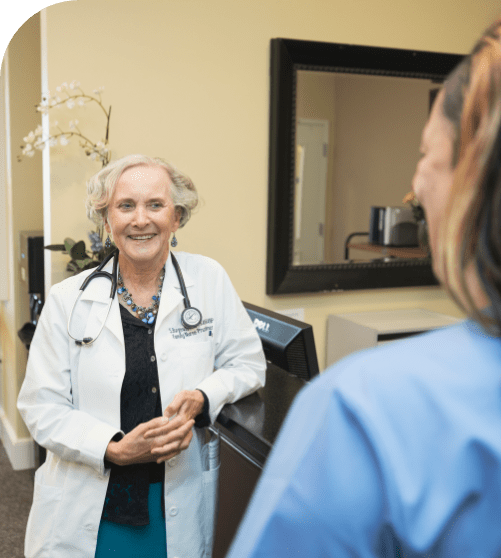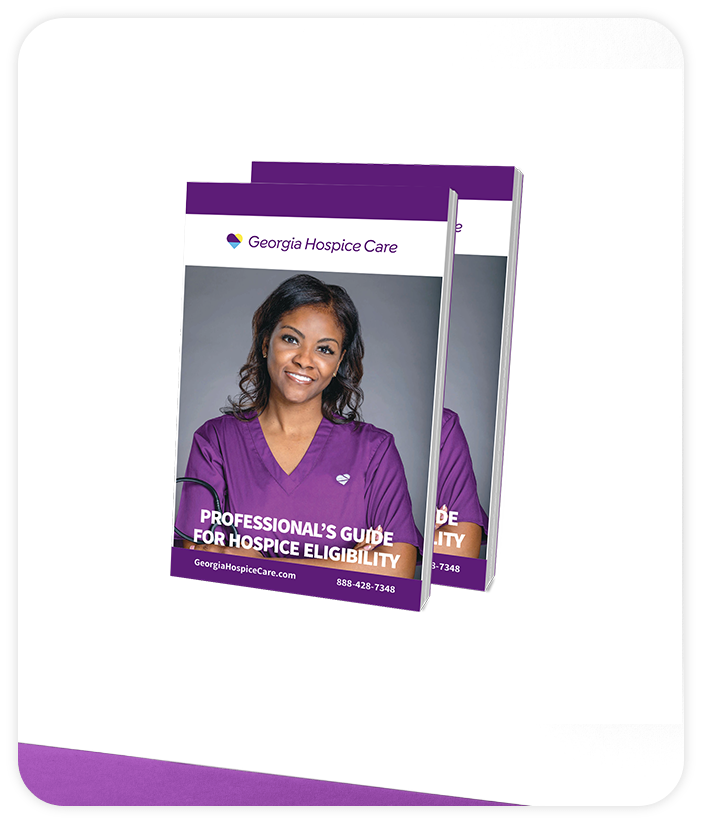
How Hospice Can Help
Hospice services are available to patients who no longer benefit from, or choose to forgo, curative treatment. The typical hospice patient has a life expectancy of six months or less, if the illness follows its expected course.
Patients who can benefit from hospice care are those in the final stages of any disease process, including chronic lung disease, congestive heart failure, AIDS, cancer, cardiovascular disease, Parkinson’s disease, Alzheimer’s and dementia, and other life-limiting, terminal illnesses.
Georgia Hospice Care offers help and support to patients and their loved ones, 24 hours a day, seven days a week. For hospice patients, help is just a phone call away.
At Georgia Hospice Care, we’re committed to providing hospice services that ensure a superior patient-family experience, whether at home, in a hospital, or in a facility such as a nursing home or assisted living community.
Patients periodically receive scheduled in-home services from members of their care team including a nurse, hospice aide, social worker, chaplain, and volunteer.
The Care Team
Registered
Nurse (RN)
Registered
Nurse (RN)
Provides care, which includes assessment, planning, and evaluation of patients needs. The nurse maintains consistent communication with the physician and hospice team.
Certified Nursing
Assistant
Certified Nursing
Assistant
Helps with personal needs such as bathing, feeding, dressing, basic housekeeping, as well as companionship.
Social
Worker
Social
Worker
Helps make decisions about care options available to patients, provides guidance on advance care directives, financial concerns, and other emotional needs.
Hospice
Physician
Hospice
Physician
Provides medical direction to the team.
Chaplain
Chaplain
Available for general spiritual support and guidance that honors the patient’s beliefs and values.
Grief & Loss Counselor
Grief & Loss Counselor
Provides compassionate support through the grieving experience; and maintains contact with the patient’s caregivers and loved ones.
Volunteer
Volunteer
Available to support in a variety of ways including personal care, errands, light housekeeping, assistance with meal preparation, companionship, and much more.
Four Levels of Comprehensive Care
Hospice patients require differing amounts of care during the course of their illness. The hospice benefit affords patients four levels of care to meet their clinical needs:
Routine home care is provided in the patient’s place of residence — in a private home, an assisted living community, a skilled nursing or long-term care facility, or another residential setting. Under routine care, the patient receives regular scheduled visits from members of their care team, based upon their individual needs. As the patient’s needs change, team members adjust their visits to accommodate these changes and ensure the best care.
If a patient experiences acute symptoms that cannot be safely or effectively managed in a residential setting, they may require a higher level of care called general inpatient (or GIP) care. GIP care is generally provided in a contracted skilled nursing facility or a hospital. Once symptoms are under control, the patient may return to their home under the routine level of care.
Many patients have their own caregivers. If you or your caregiver needs a rest from caregiving responsibilities, respite care is available. With respite care, you may stay in a Medicare-certified facility or other inpatient center for up to five days.
In the event that a medical crisis occurs that requires a higher intensity of care, continuous care is available. Skilled care may be brought into the patient’s home for up to 24 hours to potentially avert the need for a hospital visit. When the crisis is over, they can return to routine care.
Studies regarding hospice care have demonstrated significant benefits to both the patient and their family the earlier a referral to hospice is made. Pain and other symptoms are better managed, which leads to significant improvement of life and, often, longer length of life.
Our hospice care
plans are designed to:
- Support the patient and their loved ones in understanding their options for care
- Manage pain symptoms and discomfort
- Provide medical needs and equipment
- Offer spiritual assistance
- Facilitate communication


Comfort Care at the Right Time
Grief Counseling
We provide comprehensive grief support services for family members of our patients for up to a year after the loss of a loved one. The emotional and psychological consequences of losing a loved one should never be overlooked or underestimated.
The goal of grief counseling is to help cultivate a safe and healing environment for people who are adjusting to a significant loss in their lives. Through our grief support services, we hope to help families celebrate the life of a loved one and process any feelings of loss. Our grief care is extended to family members and other significant persons both before and after the death of a hospice patient.
Hospice Eligibility Guidelines
At Georgia Hospice Care, we’re with you as your care partner, and we’re committed to providing hospice services that ensure a better patient-family experience. These guidelines, which are also available as a pocket guide, are a helpful tool to determine whether a patient is eligible for hospice services.

What You Can Expect
You can rely on our team to deliver the highest clinical quality and the best patient and family experience. Partnering with us means access to:
Simple referral process
Patient consultations on advanced care planning
Corporate compliance officer certified in health care compliance
Customized care plans for patients
Palliative physical and occupational therapy for patients
Continuing education resources
Close coordination of care
Registered dietitian services
Resources for health care professionals, including advance care planning, overseeing the care plan and 11th-hour crisis assistance
24/7 call coverage
Quality assessment process improvement team
Continuing education on prognosis and disease progression
When families find themselves facing a health crisis, the physician is who they look to for guidance and assurance. Because of this, physicians must be comfortable being an important active part of that journey. We can help you and your team meet the needs of your patients and their families during this sensitive time in their lives.
